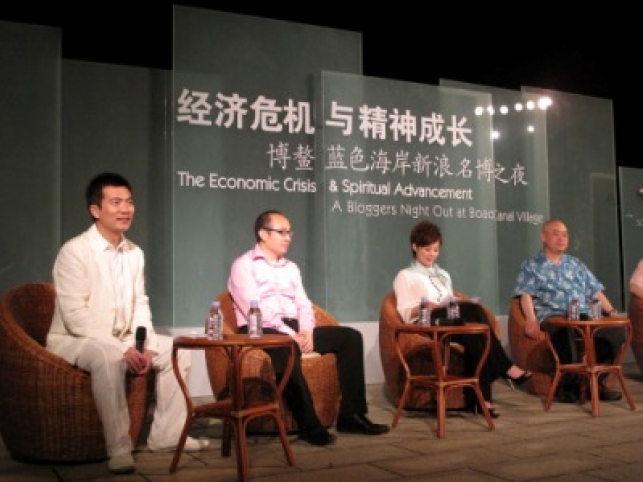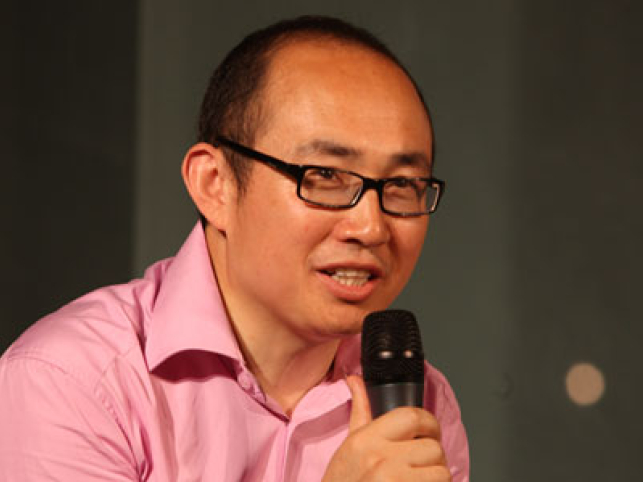The Boao Forum for Asia Annual Conference 2009 was held in Boao, China. With the theme Asia: Managing Beyond Crisis, the conference gathered over one thousand of the world’s most influential business executives, scholars, and world leaders, including Chinese Premier Wen Jiabao, former U.S. President George W. Bush, and former Japanese Prime Minister Fukuda Yasuo, to come together to discuss the most pressing issues facing Asia now. An influential Chinese business executive expressed that the source of the economic crisis comes from the crises of spirit and faith.
In a seminar with the title “Economic Crisis & Spiritual Advancement” held on the night of April 18, eight influential Chinese business executives, which include real estate guru Shi-yi Pan, Google Global Vice President in China district Dr. Kai-fu Lee, and others, were invited by Sinanet to discuss on the seminar’s theme.
With such open discussions in public from top Chinese leaders, it shows that more and more people in China are engaging in similar discussions on the relationships between the economic crisis with aspects of spirit and faith, and they value the far-reaching influences that spirit and faith can produce in the society’s economy.
At the beginning, the host raised the point that the economic crisis originating from United States has affected the whole world, and Chinese economy also suffered in various aspects, touching upon the daily lives of China’s average citizens.
“A simple economic crisis is nothing to be afraid of, for it is only a temporary pain caused by the redistribution process of the society’s wealth; however, the thing that we should be afraid of is the spiritual crisis resulting from the long-term sting on the people after the economic crisis,” said the host.
“The important work that we are facing in recent times are the questions of how can we safely pass through this abnormal time and how can we minimize the influences of the international economic crisis on China. What’s more is that we need to explore the questions of how can the unprecedented spiritual crises of this five thousand-year-old civilization be resolved.”
Chinese Christian Shi-yi Pan said that he hasn’t thought about the effects after the economic crisis, but lately he has been thinking about many of the causes of the economic crisis, which he believes has a close relationship with the crises of spirit and faith.
“From looking at the economic crisis, I saw how the simple pursuit of materialistic wealth that is without fairness, justice, love, and integrity will definitely result in an economic crisis.” Although the economic crisis is bad, it is a good thing from the spiritual perspective since it reminds us to fix the mistakes that we’ve made in the past, he said.
Pan posted an article titled “The Essence of Economic Crises is Crises of Spirit and Faith” on his blog a day before the seminar, going in depth to describe his opinions on this subject. He said that many economic incidents made him realize more deeply about the phrase that says the “Essence of Economics is Spiritual”, for materials are only an outward display of the economic performance but the essence is still spiritual.
Referring to China’s poisonous milk-powder incident that took place last year, he said that the core cause can be found in the process of rapid development where the spiritual standards of integrity and responsibilities were absent.
“When there is no light, what remains is only darkness; when there is no integrity, what remains are only lies,” said the real-estate guru.
The classical example is Bernard Lawrence Madoff, former chairman of Nasdaq stockmarket who admitted to committing a 50 billion dollar fraud, said Pan.
“Although this financial tsunami is different from the natural tsunamis, where no houses were wiped out no one was swept away by the waves, it broke the financial and economic order and crushed the people’s faith and trust, so the resulting consequences is as bad as the natural tsunami.”
“The essence of this economic crisis and financial crisis is definitely a spiritual crisis and a crisis of faith.” Pan concluded. “In a crisis, faith is more important than Gold, but the foundation of faith is integrity and trust. The more lies there are in the surrounding, the less faith people will have…..spiritual standards such as integrity, compassion, carrying responsibilities are the foundation to the wealth of the entire society. Without these fundamentals, the material wealth is like a skyscraper build on sand, difficult to continue.”
“However important spiritual standards may be, it is often times looked upon as ludicrous and childish to speak of love and to emphasize integrity in an environment without a common faith,” he said, “The foundation to raise the spiritual standards is faith.”
In a recent article published by Newsweek titled The End of Christian America, written by Jon Meacham, it used many research statistics to arrive at a conclusion that God, Christ did not die, but His influence on American politics and cultural lifestyle has reached the lowest point in history, said Pan.
“The number of Christians has decreased by 10%, but the number of atheists has increased by 10%. This phenomenon is closely tied together with the financial crisis in United States. Who is the cause and who is the result? I believe that the cause of the financial crisis is lack of faith, and the financial crisis is a result of lack of faith.”
Various people showed their agreement with Pan’s perspective. One of the audiences said, “What did the financial crisis begin? Spiritual crisis started the financial crisis, then when will the financial crisis end? I say that when the spiritual crisis ends then the economic crisis will have ended.”
Shi-yi Pan was once voted as China’s Real Estate Top 10 Developers and one of China’s Most Influential Individuals. Some say that in the largest-scale urbanization process in China’s history, every one of Pan’s architectural projects used the city’s landmark to lead the city’s architectural trend. In the past years, he was the center of attention and news coverage by media groups such as TIMES magazine, CNN, Wall Street Journal, and South China Morning Post, and etc.
The Boao Forum for Asia was established in 2001 as a platform for high-level interaction between thought leaders from Asia and around the world, with the aim of promoting the development goals of Asian countries through greater regional economic integration.
The original inspiration for the forum can be traced back to September 1998. Noting that Asia as a whole lacked an economic forum led by Asians and guided by Asian interests and views, former Australian Prime Minister Bob Hawke, former Japanese Prime Minister Morihiro Hosokawa and former Filipino President Fidel V. Ramos put forward a proposal to establish a Forum for Asia. Three years later, the first BFA Annual Conference was held in Boao, Hainan Province, China. In the intervening years, the Boao Forum for Asia has gone on to become the most active and influential forum of its kind in the region, driving dialogue and debate on Asia’s future.
Reporter Ruth Wong contributed to this report.









